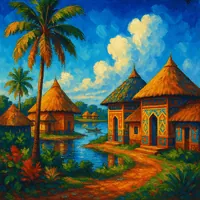Sapele, nestled in Nigeria's Delta State, stands apart with its rich history as a timber hub, famed for its iconic Sapele wood, prized globally for crafting fine furniture and musical instruments. This riverside city thrives on the vibrant culture of the Urhobo people, where traditional dance and the melodious rhythms of native songs fill the air. Sapele is uniquely marked by its seamless intertwining of nature and industry, evident in the distinctive aroma of cocoa processing alongside the swaying palm-lined roads.
Notable points about Sapele
- Economic Hub: Sapele is renowned for its vibrant timber and plywood industry, which has historically been a significant contributor to both the local and national economy. This industrial backbone distinguishes it from many other Nigerian cities that might rely more heavily on agriculture or other types of industries.
- Cultural Diversity: Sapele is a melting pot of different ethnicities, prominently featuring the Urhobo, Itsekiri, and Ijaw cultures. This rich cultural diversity is reflected in the city's festivals, cuisine, and daily life, making it a unique blend of traditions for cultural enthusiasts.
- Location and Geography: Situated on the banks of the Ethiope River, Sapele offers picturesque views and opportunities for water-based activities, which can be particularly appealing to singles or couples looking for serene natural landscapes and outdoor activities.
- Historical Significance: Sapele played a crucial role in Nigerian history as a prominent colonial administrative and trade center. The city's colonial architecture and historical landmarks, such as the African Timber and Plywood Company, offer insights into the nation's past and attract history buffs.
- Comparative Advantage: Unlike many other Nigerian cities, Sapele benefits from its strategic location near both the rich Niger Delta and the commercial hub of Warri, giving it a unique position for commerce and trade. This strategic advantage fosters a dynamic business environment different from other regions.
- Community and Celebrations: Known for its vibrant festivals such as the Okpe Festival, Sapele offers a glimpse into lively local celebrations and community spirit, making it an engaging destination for visitors seeking authentic cultural experiences.
- Education and Learning: Sapele hosts a range of educational institutions, providing opportunities for families with children looking for quality education. Educational facilities in the city offer diverse options from primary through tertiary education.
- Developing Infrastructure: While Sapele is growing, it still retains a small-town charm with a slower pace of life compared to mega-cities like Lagos or Abuja. This aspect makes it attractive to retirees or those seeking a quieter lifestyle with the amenities of city living.
- Religious Centers: The city is home to multiple religious sites, including churches and mosques, that reflect its pluralistic religious landscape. These centers play a significant role in community life and serve as landmarks for those interested in religious or architectural tours.
- Hospitality and Cuisine: Known for its delectable local delicacies like Banga soup and Ukodo, Sapele offers a range of dining experiences that cater to food lovers. The city's eateries provide both traditional and modern culinary delights, making it a prime spot for gastronomy enthusiasts.


